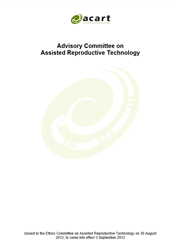Posthumous Reproduction: A review of the current Guidelines for the Storage, Use, and Disposal of Sperm from a Deceased Man to take into account gametes and embryos

Posthumous reproduction involves the use of a person’s sperm or eggs, after their death. In some cases, it also involves the retrieval of these gametes very shortly after death or at a time when death is imminent. While scientific advances have made this form of reproduction possible, there are many complex ethical and legal issues that have not yet been resolved. For example, the existing Guidelines, written in 2000 apply only to the posthumous use of sperm that was retrieved prior to the man’s death.
Relevant issues that the current Guidelines do not address include:
- use of stored eggs, after the death of a woman
- use of stored embryos after the death of one or both of the gamete donors
- retrieval of sperm from a deceased man
- retrieval and use of eggs from a deceased woman
- retrieval and use of reproductive tissue from a deceased man or woman
- retrieval and use of sperm or eggs from a person who has become permanently incapacitated and whose death is imminent.
ACART is undertaking a two stage consultation to assess the need for change in how we regulate posthumous reproduction in New Zealand. ACART is reviewing the current Guidelines on posthumous reproduction to take into account all gametes (not just sperm) and embryos. This stage one consultation document presents for public consideration the background, rationale and policy options for a review of the Guidelines for the Storage, Use, and Disposal of Sperm from a Deceased Man.
We are seeking public feedback on significant policy issues about whether and in what circumstances posthumous reproduction is acceptable. The paper also raises important ethical questions about the retrieval and use of gametes from a person who is no longer able to consent. We also raise issues about who should be able to authorise the retrieval and use of gametes, and how any regulatory mechanism might operate.
The purpose of this consultation is to canvas public opinion on issues identified in this document. This document does not contain recommendations as we are seeking public feedback on these significant policy issues prior to developing proposed new guidelines.
The deadline for feedback closed 14 September 2018.
Download
